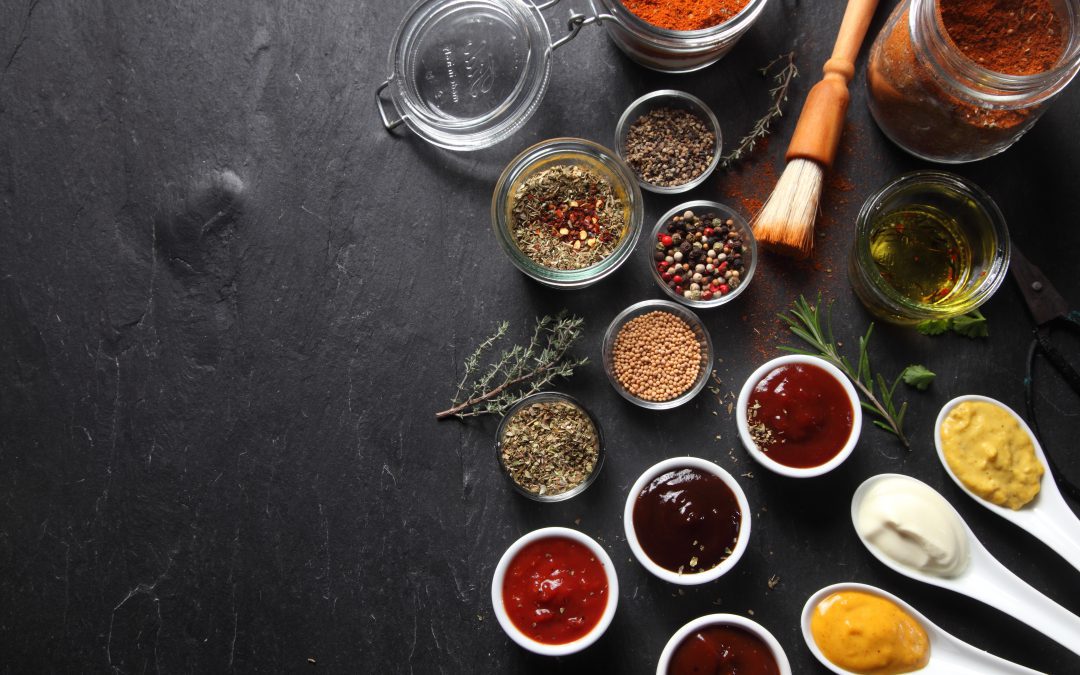Marinades
Marinades, like dry rubs, are meant to impart extra flavor in meat, fish, or vegetables – but they are a bit trickier to use.
Here is the starter marinade recipe, which can be used to set up all of your other marinades:
Ingredients for the Basic Marinade
- 2 tablespoons brown sugar
- 1/2 cup soy sauce
- 1/8 cup lemon juice
- 2 tablespoons oil (olive oil or canola oil)
Combine the first three ingredients, and mix well. Slowly whisk in the olive oil.
Here are three quick, easy, flavorful marinades, using the Basic Marinade recipe to start.
Ingredients for Italian Marinade (good for steaks, pork, & chicken)
- 1 portion of the Basic Marinade
- 1/2 cup dry red wine (Chianti works well)
- 1 tsp Dijon mustard
- 2 tbs minced garlic
- 2 sprigs of fresh rosemary
Whisk all ingredients together. Place meat in a bag, marinate for 2-4 hours. If you are using flank steak (as we discussed), you can leave it in the marinade over night. See our Grilled Marinated Grill Flank Steak recipe from March 2014.
Ingredients for Asian Marinade (good for fish, pork, & chicken)
- 1 portion of the Basic Marinade
- 1/4 cup rice wine vinegar
- 1 tablespoon sesame oil
- 1 teaspoon ground coriander
- 2 tablespoon minced garlic
- 2 tablespoon minced ginger
Ingredients for Mexican-inspired Marinade (good for any ingredient)
- 1 portion of the Basic Marinade
- 1/2 tsp. freshly ground cumin
- 1/4 cup lime juice
- 2 tablespoon minced garlic
- 2 tablespoon minced ginger
- ½ tsp. dried oregano
- Optional: 1 finally chopped chipotle pepper
How to use Marinades
In deciding how long to use the marinade, consider the texture of the meat or fish. In general, open-textured flesh like fish fillets needs only a few minutes of soaking. I love making “fish fingers” by briefly immersing strips of fish fillets in buttermilk seasoned with cayenne, dusting them with seasoned flour, and then frying them. Food with a tighter texture, such as chicken or lamb, can tolerate several hours in a marinade. Be very careful with pork, especially the leaner cuts such as pork tenderloin – marinate for 4 hours or less.
I like using marinades on vegetables, but using a slightly different method. I will allow the vegetables to “sweat” by salting first, then patting dry. I then let the vegetable marinate for 30 minutes to 1 hour; remove the vegetables from the marinade, then pat dry again. Saute with oil, or an oil and butter combination, then add back about 2 tablespoons of the marinade at the end for extra flavor.
There is a commonly held belief that soaking a tough cut of meat in a marinade will make it tender. Sadly, this just isn’t true – if you marinate long enough, meat will actually get tougher. In some cases (such as fish and shellfish), it will go past this point, and get mushy.
Marinades are usually made up of four components: acid, salt, herbs (flavorings), and oil. The acid helps to “denature” proteins – this simply means this means you are unwinding proteins (they are usually made up of tight bundles). The same thing happens when you expose proteins to heat. When a chef makes ceviche, it is often termed “cold cooking:” the proteins in the fish are denatured by lime juice.
If you use a mildly acidic marinade, and you marinate over a short period of time, the acid will release water molecules that are attached to and trapped within the tightly wound protein mesh: the meat remains juicy and tender. If the protein is in a very acidic marinade, or if you make the mistake of marinating overnight, the protein tighten up again, water is squeezed out, and the tissue becomes tough. If you’ve ever tried marinating shrimp in highly acidic ingredients, it’s likely that you’re familiar with this result. Nasty.
One exception to this rule is flank steak. A flank steak can survive a more acidic marinade, or a mildly acid marinade overnight. Since the marinade only penetrates a fraction of an inch, it won’t toughen the meat.
Dairy products are, in my opinion, the only marinades that truly tenderize. Hunters have long known to marinate tough game in milk, Indian recipes use yogurt marinades for lamb and tough goat meat, and some southern cooks soak chicken in buttermilk before frying. Buttermilk and yogurt are only mildly acidic, so they don’t toughen the way strongly acidic marinades do. It’s not quite clear how the tenderizing occurs, but it seems that calcium in dairy products activates enzymes in meat that break down proteins, a process similar to the way that aging tenderizes meat.



